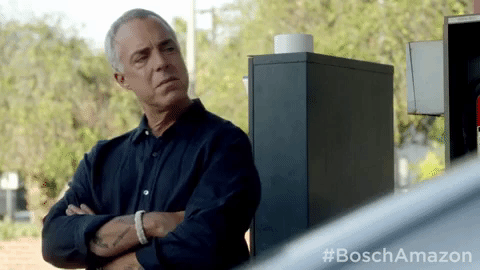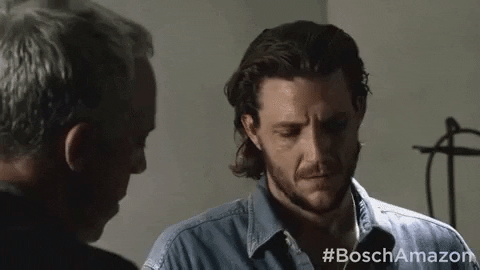Mic Drop #19: IMDb TV Demands More of Our Attention with "Bosch" Spinoff
With IMDb TV, Amazon continues to make tactical moves that buck market trends
I’ve been beating the drum for Amazon’s IMDb TV strategy for awhile now, and today I’m going to beat that drum some more with the news of a Bosch spinoff going to IMDb TV:
Bosch is set to end on Amazon's Prime Video later this year, but the character of Harry Bosch will live on in a spinoff at the tech giant's ad-supported streaming service, IMDb TV.
Titus Welliver, Mimi Rogers and Madison Lintz will continue their roles on the spinoff, and much of the Bosch creative team, including series creator Eric Overmyer and author Michael Connelly, is also involved. The untitled spinoff is slated to begin filming later this year; the seventh and final season of Bosch will debut in the summer.
Before we dive into the significance of this announcement, two disclaimers:
I’ve never watched an episode of Bosch (nor do I plan to) but I have heard good things. So this post won’t be fanboy love for an Amazon Prime Video series that will be ending after seven seasons.
the Bosch GIFs are humorless. Seriously, see for yourself. I’m doing the best I can with a whole lot of dour this week.
The spin-off of Bosch isn’t a move with existential, make-or-break implications for either IMDb TV or Amazon Prime Video.
But it is a significant reflection of how much more fundamental IMDb TV is emerging as Amazon’s TV future than Prime Video. IMDb TV is becoming one of those, “blink, and you’ll miss it” stories of rapid, real-time evolution.
The Bosch is the first move of its kind
The most fascinating part of this move is that Amazon is neither:
cancelling a long-running series, as Netflix tends to do; nor
releasing a spin-off on the same channel, as Network TV has historically done.
The move of Bosch from Prime Video to IMDb TV is the first of its kind: an SVOD cancelling a series and launching the spin-off series on its own emerging free AVOD. , That makes it unprecedented. There are only three other companies in a position to something similar:
NBCU, with NBC network and Peacock (hybrid SVOD and AVOD)
ViacomCBS, with Paramount+ and Showtime (SVOD), and Pluto TV (AVOD)
Discovery, with discovery+ premium and free tiers
Meaning, there are few others in the marketplace who can make a similar competitive move with content. And none have, to date.
For lack of an available comparison, this move would be like NBC launching a Saved By the Bell spin-off exclusively on Peacock’s free tier after cancelling the Peacock-exclusive series.
The Big Question: Economics
The adage, “just because you can do something doesn’t mean you should” comes to mind here when thinking about the economics of a move like this.
On the surface, the economics of the move are:
end the contractual economics of producing Bosch for Amazon Prime Video after seven seasons, where the show and/or each viewer is probably more expensive given Amazon Prime Video is an SVOD with 150MM members worldwide; and,
launch a new series with contractual economics around an AVOD-exclusive model, where the upfront payment for the show and/or each viewer reflects the lower economics of the AVOD model (IMDb TV is a free tier), and some marginal value to Amazon advertisers.
One implication of these economics is that with an AVOD title not called “Bosch”, but with the same cast and production team, both Amazon and the Bosch producers see a more lucrative future for the Bosch series on IMDb TV than on Prime Video.
Or, put in terms of Prime Video vs. IMDb TV, Amazon and the Bosch producers are willing to trade away the economics and lower risks of guaranteed revenues (Prime subscriber payments) in exchange for a share of less guaranteed, but likely growing, sponsorship and advertising revenues.
If we use Peacock and Hulu’s $5 to $7 monthly average revenue per user (ARPU) as a reference point, Amazon is communicating with this move that the $5 to $7 monthly ARPU is more valuable to it than the Prime Member who is worth ~$10 to $12.99 per month. In other words, it believes with moves like the Bosch spin-off it can get more users at a lower ARPU to watch Bosch than Amazon Prime subscribers at a higher ARPU.
Those economics read like an unusually risky bet.
So, Why Is Amazon Making This Move?
That said, the perceived risk here may not be the actual risk here.
A quote from WarnerMedia CEO (and ex-Amazon employee) Jason Kilar at the Morgan Stanley Technology, Media & Telecommunications Conference this week shed light on why the move may not only be less risky than another season of Bosch on Prime Video, but also smart market precedent:
"It turns out that most people on this planet are not wealthy. If we can wake up and use price and be able to kind of invent and do things elegantly through advertising to reduce the price of the service, I think that’s a fantastic thing for fans,"
Amazon appears to be putting more content like Bosch on IMDb TV with this logic in mind: most people on this planet are not wealthy, and IMDb TV may be a better vehicle to reaching them than Prime Video1. That reality may be getting in the way of Prime Membership growth, and therefore Bosch viewer growth. In fact, after revealing 150MM Amazon Prime Members in January 2020, Amazon opted not to release those subscriber numbers in its most recent earnings release. This implies that those Prime Member numbers may have declined year-over-year.
If Prime Memberships are indeed declining, another season of Bosch, either as it is or in a spin-off, is highly unlikely to be a difference-maker. In fact, it becomes more expensive for Prime Video to produce because the return is lower.
But, Prime Video has established there are audiences who will pay to watch Bosch. The key question is, how large is the audience who will want to watch Bosch without a Prime membership?
Or, put another way:
how many of
150MM downloads of the IMDb app,
250MM monthly unique visitors, and
50MM Fire TV devices
…will want to watch Bosch now that it’s not longer behind a paywall?
(2) And, how valuable are those audiences to Amazon’s advertisers within the Amazon ecosystem?
The answer to the first question will tell us the limits of the Prime Video value proposition.
The answer to the second question will tell us the upside of a show like a Bosch spinoff to helping Amazon advertisers reach broader TV viewing audiences who “are not wealthy”.
This Move Is Significant
Amazon is the first SVOD and AVOD streaming service that is moving an SVOD-only series to an AVOD-only series, even if as a spinoff.
There are a number of reasons why the move is significant. First, because Amazon can make this move, and only three other services can do so with scripted content.
Second, because IMDb TV increases the Total Addressable Market to make the audience larger for series like Bosch outside of Amazon Prime Video than within it.
Last, because Amazon appears to be willing to sacrifice the economics of distributing content on Prime Video for a higher monthly ARPU in exchange for more scale and more audience at a lower monthly ARPU.
In other words, with the spinoff of Bosch Amazon is making a bet that its free distribution channel IMDb TV may be a better and more lucrative distribution channel than its paid distribution channel Prime Video has been, to date. In that move, it seems to be pursuing a completely different set of tactics than its competitors are pursuing, especially around the economics of a free tier.
HBO Max, annually, is $179.88, and an Amazon Prime Membership is $119 annually, so HBO Max likely has a smaller Total Addressable global Market at 150% of Amazon Prime’s price.




